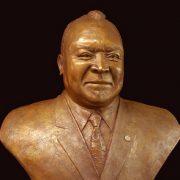2013 Thurgood Marshall Lecture
(Reprinted from UCLA Today – Apr 05, 2013 By Ricardo Vazquez)
Thurgood Marshall Lecturer Assesses Progress of Civil Rights Struggle
On Thursday, a day that marked the 45th anniversary of the assassination of Dr. Martin Luther King Jr., John Mack, a longtime civil rights leader in Los Angeles, told an audience attending the 24th Thurgood Marshall lecture that the march on Washington 50 years ago was a watershed event, a catalyst and inspiration that got the attention of millions of Americans and “set in motion an unprecedented drive for civil rights in America.”
Mack, who is vice president of the Los Angeles Police Commission that oversees and sets policy for the city’s police department, delivered the annual lecture at Covel Commons. It’s part of a public lecture series sponsored by UCLA’s Bunche Center for African American Studies and named in honor of the late U.S. Supreme Court justice.
The civil rights leader highlighted the progress that has been made thus far in the struggle for justice and equality, citing examples of institutional reform in the private sector as well as in the Los Angeles Police Department. It’s proof that institutions can change, he said. But he emphasized that a lot of work remains to be done.
“Despite our best efforts, we still have big problems,” Mack said, calling on the audience to continue the struggle for civil rights and equality to ensure that everyone who is seated at the table of justice becomes a full partner.
Each year, the Bunche center selects a distinguished scholar, legal practitioner or activist who, like Marshall, has had a long and successful record of advocacy and who has made significant contributions to the struggle for civil rights.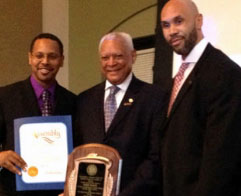
—————
Derrick Mims (from the left), district director for California Assemblymember Reginald Jones-Sawyer, D-Los Angeles, presents a certificate of recognition from the state to John Mack, the 2013 Thurgood Marshall honoree. Mack also received a plaque from Darnell Hunt, director of UCLA’s Bunche Center for African American Studies.
Q&A with John W. Mack
This year’s Thurgood Marshall Honoree, John W. Mack, is the Vice President of the Los Angeles Police Commission. Mack served as President of the Los Angeles Urban League from August of 1969 until his retirement in 2005. He began his career with the Urban League in Flint, Michigan in 1964 and was appointed Executive Director in 1965. Prior to heading the Los Angeles Urban League, Mack served on the Urban League’s National staff for six months during the Whitney Young era in Washington, D.C. Mack was a leader in the 1960 student civil rights movement in Atlanta – and Co-Founder and Vice Chairperson of the Committee on the Appeal for Human Rights. John W. Mack was appointed to the Board of Police Commissioners by Mayor Antonio R. Villaraigosa in August of 2005, where he has served as both President and Vice President of the five-person Police Commission.
Ed. Your lecture as the Thurgood Marshall Honoree is titled, “The March on Washington: 50 Years Later.” Why revisit that event now?
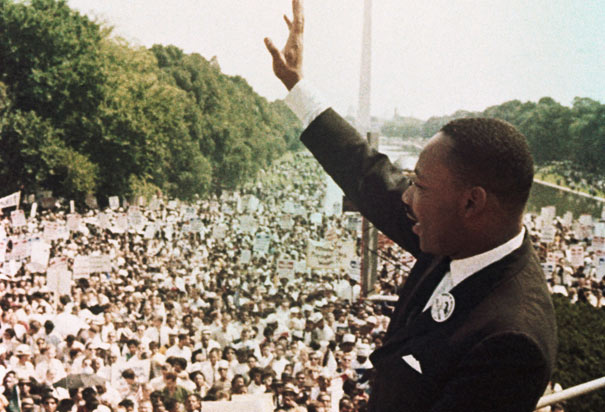
J.M. August 23rd will be the 50th anniversary of the event and it is important from a historical perspective to revisit the march and the impact that it had. Quite frankly, it changed the course of civil rights in America in so many ways. Of course, the march was highlighted by Martin Luther King Jr.’s “I Have A Dream” speech, which inspired all of the 250,000 people who showed up. When you look at the course of the movement prior to that time, in many ways, the march was the new Emancipation Proclamation for America. At that time, segregation was deeply entrenched, particularly in the south and this was the response to that continued racism and discrimination.
Ed. How did the march inspire you?
J.M. When you look at the course of history, the March on Washington and King’s speech, (which I believe was one of the greatest speeches in American history) it pricked the conscious of many who were sitting on the sidelines and indifferent to the struggles African Americans were facing. The march elevated the issue to a new level. The March on Washington, coupled with the Bloody Sunday March, were the primary mobilizing events that moved President Johnson to pass the 1965 Voting Rights Act. And in so many ways, that laid the foundation for the ultimate election of President Barack Obama, the nation’s first African American president. So you see, there is a very important connection between that history [the March on Washington] and today. When we look at Obama’s election and reelection, there is no question that it took a broad, diversified collation to make change happen, just as it did back in the 60’s. And it happened today in spite of the fact that in over 20 states, Republican governors are still trying to suppress the voting rights of people of color. It is a reminder that every time we take major steps forward, there are a few steps back.
Ed. So do you agree with people when they say that today, we are living in a “post racial” time?
J.M. Idea of post racial America is an elusive goal. If it weren’t so serious it would be a joke, it would be laughable. Those who state that we are in a post racial time don’t get it. They are not in touch and are either in denial or naïve when look at today’s realities. Drawing the conclusion – that we are in a post racial time – is probably one of the good news, bad news results of the Obama election. People thought that when Obama was elected that it meant that all the problems of race were solved. While his election was a monumental event, and an event I’m personally very proud of and I’m confident that millions and millions of African Americans and other people of good will across the board are proud of, we still have attempts to suppress the rights of people of color. So when you look at where you are today, we have a mixed bag. We now have African Americans who are beginning to crack the glass ceiling, not shatter it, but crack it, like Ken Chenault, who is black and is the CEO of American Express, that’s undeniable progress, but the unemployment rate for Blacks is still 2-3 times higher than it is for whites. We’ve made some progress in implementing King’s dream, but it is incomplete.
Ed. You had a legendary tenure at the Urban League, serving from 1969 to 2005. What are some of the accomplishments that stand out for you?
J.M. It was my great privilege to serve as president of the Urban League for almost 30 years, and there were highlights and low lights. When I look at the first and most important change that I experienced and had the opportunity to be a part of, I would have to say it involved the Los Angeles Police Department. During my tenure at the Urban League, I, along with other leaders of non-profits, Civil Rights organizers, and ministers, battled with the LAPD, particularly during the Daryl Gates era. During that time, the LAPD functioned as an occupation force in the Black community. There were the series of choke hold incidents. It was being applied very widely and indiscriminately and as a result 21 black males died. Gates claimed it was because there was something medically wrong with the young Black men and had nothing to do with the officers and their behavior. We held a press conference at the Urban League with the late Johnny Cochran, and Dr. Madison Richardson, prominent ears, nose and throat doctor. Johnny Cochran condemned the police actions from a legal perspective, Dr. Richardson confirmed that the young Black men were not dying from the choke hold because of any inherent defects, clearing them from medical perspective, and I spoke about the choke hold policy from a human rights perspective. That event led to change in the LAPD choke hold policy.
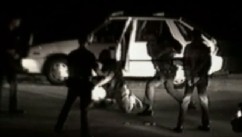 Then there was Rodney King incident. That brutal beating of Rodney King ultimately served as a major catalyst for reforms in the LAPD. During the whole process, we demonstrated and protested to the police commission and the city council and as a result of our collective actions, Mayor Bradley appointed Warren Christopher. The Christopher Commission’s report was a very important milestone and its recommendations laid the foundations for strengthening the role of police commission. In my role at the Urban League, I testified publically and privately before the commission and served on the committee that mobilized, educated, and persuaded the voters to approve the recommendations of the Christopher Commission. Some of those changes included limited term limits for the police chief and creating the office of inspector general for the police commission, which has oversight over LAPD activities. This was very important.
Then there was Rodney King incident. That brutal beating of Rodney King ultimately served as a major catalyst for reforms in the LAPD. During the whole process, we demonstrated and protested to the police commission and the city council and as a result of our collective actions, Mayor Bradley appointed Warren Christopher. The Christopher Commission’s report was a very important milestone and its recommendations laid the foundations for strengthening the role of police commission. In my role at the Urban League, I testified publically and privately before the commission and served on the committee that mobilized, educated, and persuaded the voters to approve the recommendations of the Christopher Commission. Some of those changes included limited term limits for the police chief and creating the office of inspector general for the police commission, which has oversight over LAPD activities. This was very important.
Ed. Then after your retirement from the Urban League, it was sort of a natural move to serving on the Pol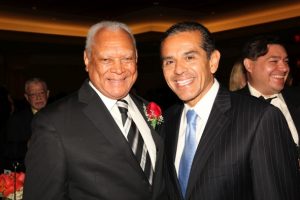 ice Commission?
ice Commission?
J.M. At the time it didn’t feel like it was a natural progression, but Mayor Antonio Villaraigosa thought it was! Based upon his experience, he appointed me. He knew I’d been an advocate and external critic of the force and because of that, he felt that my colleagues and I could provide the kind of independent oversight needed. I am proud of the progress that the LAPD has made – it is different institution today, a changed institution. As a result of Rodney King and Rampart corruption scandal, the police commission and then Police Chief Bill Bratton had the leverage and legal authority in certain areas to make sure that the department addressed some of those historic problems.
As I reflect upon my years as president of the Urban League, fighting the LAPD tooth and nail, and in my role at the police commission, the change that has occurred on the force is a major highlight of my history at both the Urban League and as President and Vice President of the Police Commission.
Ed. What issues do you think are still at the forefront for the police commission to address?
J.M. We cannot become complacent. It is important that we ensure that issues of discrimination are effectively addressed. We recently had before us the extremely tragic series of murders by Christopher Dorner. While that killing spree cannot be justified, Dorner raised serious allegations of institutionalized racism. He alleged that he was discriminated against and that the LAPD is still rampant with discrimination. I reject that the LAPD is filled with institutional racism. But the reality is, when you have ten thousand people from all walks of life working together, there can be individual acts of racism. Chief Beck has authorized a review, and frankly, will look at the disciplinary system itself to see if there are areas of unfairness that can be improved upon. We have to remain vigilant in our oversight from that standpoint.
These past eight years, as I’ve moved around this city and participated in numerous meetings in Watts, in South Los Angeles, I’ve seen a different relationship between the police and the Black community. They have developed a mutual respect and a mutual trust. We can’t kid that when allegations are made — it is of concern and needs to be investigated. When these types of allegations are made, it makes us question if we’ve made progress or if we’ve gone backwards. The 5 of us on the Police Commission want to make sure we stay on top of it.

